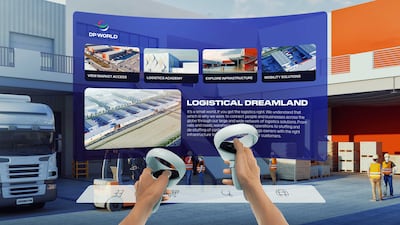Dubai Metaverse Assembly: 'Immense demand' for places
Dubai's government has unveiled a metaverse strategy that aims to create 40,000 jobs and add $4 billion to the emirate's economy in the next five years as it continues to boost efforts to tap into the emerging digital space.
The Dubai Metaverse Strategy is an “integrated plan” that aims to position the emirate among the top 10 cities that will shape the emerging technology's future globally, Sheikh Hamdan bin Mohammed, Crown Prince of Dubai, said in a tweet on Monday.
Sheikh Hamdan said the plan is the “next revolution in the technological and economic field that will affect all aspects of life over the next two decades”.
The initiative aims to double the number of blockchain companies and the metaverse by five times.
Sheikh Hamdan said there are currently 1,000 companies in Dubai working in the metaverse, which contribute $500 million to the national economy.
“We expect it to rise strongly during the coming period,” he said.
The metaverse is the emerging digital space in which people, represented by avatars or three-dimensional likenesses, can interact in virtual worlds.
It is part of Web3, the next evolution of the web, with blockchain, decentralisation, openness and greater user utility among its core components.
The value of the global metaverse market is forecast to exceed $1.6 trillion by 2030 at a compound annual growth rate of more than 50 per cent, from an estimated $40bn in 2021, according to Canada-based Precedence Research.
The UAE has taken a number of major steps to integrate the metaverse and its related technology — including blockchain, cryptocurrencies and other Web3 innovations — into the economy, government and society as part of efforts to develop the future economy.
In May, Dubai's Virtual Assets Regulatory Authority (Vara) said it had entered into the metaverse with the establishment of its Metaverse HQ, making it the first regulator to have a presence in the emerging digital space.
Vara was established by Sheikh Mohammed bin Rashid, Vice President and Ruler of Dubai, in March under the Dubai Virtual Asset Regulation Law, the first law in the emirate that regulates virtual assets.
The body aims to create an advanced legal framework to protect investors and provide international standards for virtual asset industry management to enable responsible business growth in the emirate.
Last month, Magnati, the payments business unit of First Abu Dhabi Bank, unveiled Magnati-MetaV, a metaverse platform that aims to offer consumers access to the growing experiential e-commerce segment and boost retailer revenue.
It is the “first” metaverse marketplace platform in the region to be running on a company's own blockchain technology and fully integrates the metaverse with traditional payment networks.
On Monday, Kraken, one of the world’s biggest cryptocurrency exchanges, teamed up with the National Bank of Ras Al Khaimah to offer UAE investors the ability to trade virtual assets in dirhams through their local bank accounts.
Interest in metaverse-related jobs is also rising, surging more than tenfold in past months, showing that the once barely-known concept is now very much on the radar of the workforce and companies, a May study from Bankless Times showed.
Earlier this month, the UAE's Ministry of State for Digital Economy, AI and Remote Working System signed a preliminary agreement with blockchain data platform Chainalysis to provide virtual training programmes for the country's government entities.
Sheikh Hamdan said the Dubai Metaverse Strategy would be essential to the emirate's goals of becoming one of the leading economies for the metaverse and a major centre for the global community.
The initiative aims to cover all aspects of the metaverse's development, from formulating regulations and developing applications to nurturing talent and determining ways how these solutions can be used by government entities.
“Dubai was and will remain a precedent for others globally because [Vice President and Ruler of Dubai Sheikh] Mohammed bin Rashid has proven to the world over and over again the sense of his future and development vision that made Dubai,” Sheikh Hamdan said.


